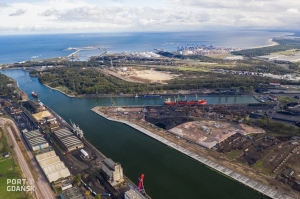


(Posted on 14/01/21)
The Port of Gdansk has announced that key projects within the largest investment programme in its history, covering €1.3 billion of infrastructure investments, will be completed in 2021.
Port of Gdansk President ?ukasz Greinke said the improvements, which number almost 40 projects, are a giant leap forward as it seeks to establish its position as the pre-eminent Baltic port with access to a hinterland and foreland of 120 million people reaching across Poland, the Czech Republic, Slovakia, Hungary, Ukraine, Belarus and Scandinavia.
The Port of Gdansk is a major international transportation hub situated in the central part of the southern Baltic coast, which ranks among Europe’s fastest growing regions.
Mr Greinke said the investments focus on the ‘Inner Port’ and ‘Outer Port’ areas and are crucial to its ambition to compete with the deep seaports of Western Europe and grow cargo handling capacity to more than 60million tonnes within five years. He said this target remains on course after the port rebounded strongly to the covid crisis managing around 48.5million tonnes of cargo in 2020, despite the global slowdown. The robust performance means Gdansk is now officially in the top 20 biggest ports in Europe for the first time.
Mr Greinke said the investments, which are in various stages of completion, are being driven by a group of public and private organisations working in partnership including the Port of Gdansk, the Maritime Office Gdynia, a Government agency managing the Gulf of Gdansk, and PKP Polskie Linie Kolejowe the Polish railway infrastructure manager, as well as businesses based in the port. He said the most important and largest investments are being 85 per cent co-financed by the European Union through the Connecting Europe Facility (CEF) instrument.
“This massive infrastructure programme sends a positive message to shipping lines, freight forwarders and businesses across our hinterland,” he said. “The Port of Gdansk is investing, improving and growing. There is a passionate shared vision here to make Gdansk the ‘gateway to the Baltic’ and we are supported by a wide range of stakeholders from across Government as well as partner businesses and investors. The investments in the Inner and Outer Ports enable us to offer a faster, more efficient and more competitive service. And we have proven this year that our ability to handle all types of cargo makes us agile, resilient and highly attractive to a wide range of businesses. Our ultimate goal is to position Gdansk as a key logistics hub for countries across Central and Eastern Europe at the heart of global supply chains. The Port of Gdansk is now an important industrial centre and wholesale and distribution hub with comprehensive intermodal transport links. These investments will encourage more production companies interested in obtaining goods from the Port, such as raw materials or components for production, to invest here.”
Mr Greinke said a very important investment due to complete in mid-2021 is the €163million (736 million zloty) extension and modernization of the road and rail network at the Outer Port.
According to the strategy of European Union the Port of Gdansk plays a significant role as a key link in the Trans-European Transport Corridor No. 1 connecting the Nordic countries with Southern and Eastern Europe. The Port of Gdansk is comprised of two principal sections with naturally diverse operational parameters: the inner port stretched along the Dead Vistula and the port canal, and the outer port affording direct access to the Gulf of Gdansk. The inner port offers a comprehensive range of terminals and facilities designed to handling containerised cargo, passenger ferries and Ro-Ro vessels, passenger cars and citrus fruit, sulphur, phosphorites and other bulk. The other quays fitted with versatile equipment and infrastructure are universal in use and enable the handling of conventional general as well as bulk cargo such as rolled steel products, oversize and heavy lifts, grain, artificial fertilizers, ore and coal. The outer port performs its operations on piers, quays and cargo handling jetties situated immediately on the waters of the Gulf of Gdansk. This section of the port offers state-of-the-art facilities suited to handling energy raw materials such as liquid fuels, coal and liquefied gas.
Euroports has announced the renewal of the concession for Terminal Rinfuse Venezia (TRV) at Porto Marghera... Read more
Contributing to the commitment of achieving net zero emissions by 2050, the Panama Canal authority has... Read more
The Saguenay Port Authority in Quebec has ordered a Konecranes Gottwald ESP.6B Mobile Harbor Crane for... Read more
North Sea Port Supervisory Body has appointed Cas König as the port authority's new CEO. Kö... Read more
After 19 years at the helm of the Port of Trois-Rivières and a career rich in major projects,... Read more
Abu Dhabi based AD Ports Group, an enabler of integrated trade, transport and logistics solutions, has... Read more
The Port of Rotterdam and Port of Antwerp-Bruges have welcomed the Clean Industrial Deal, through which... Read more
The Canadian Port of Trois-Rivières is delighted to have received major funding of $87.1 million... Read more
Belgian logistics giant Katoen Natie has ordered four all-electric Konecranes Gottwald Mobile Harbor... Read more
AD Ports Group, Abu Dhabi based enabler of integrated trade, transport and logistics solutions, has... Read more